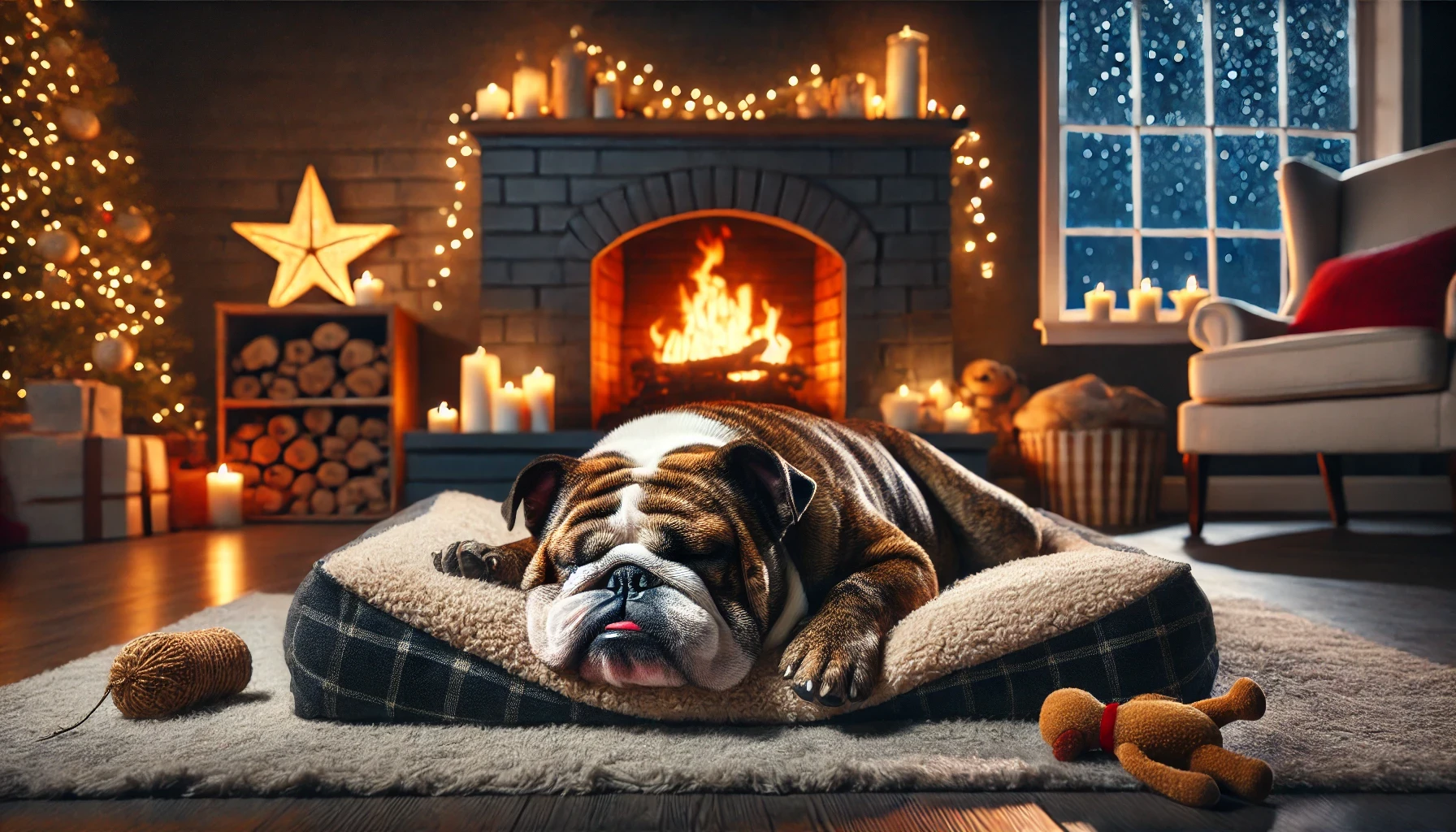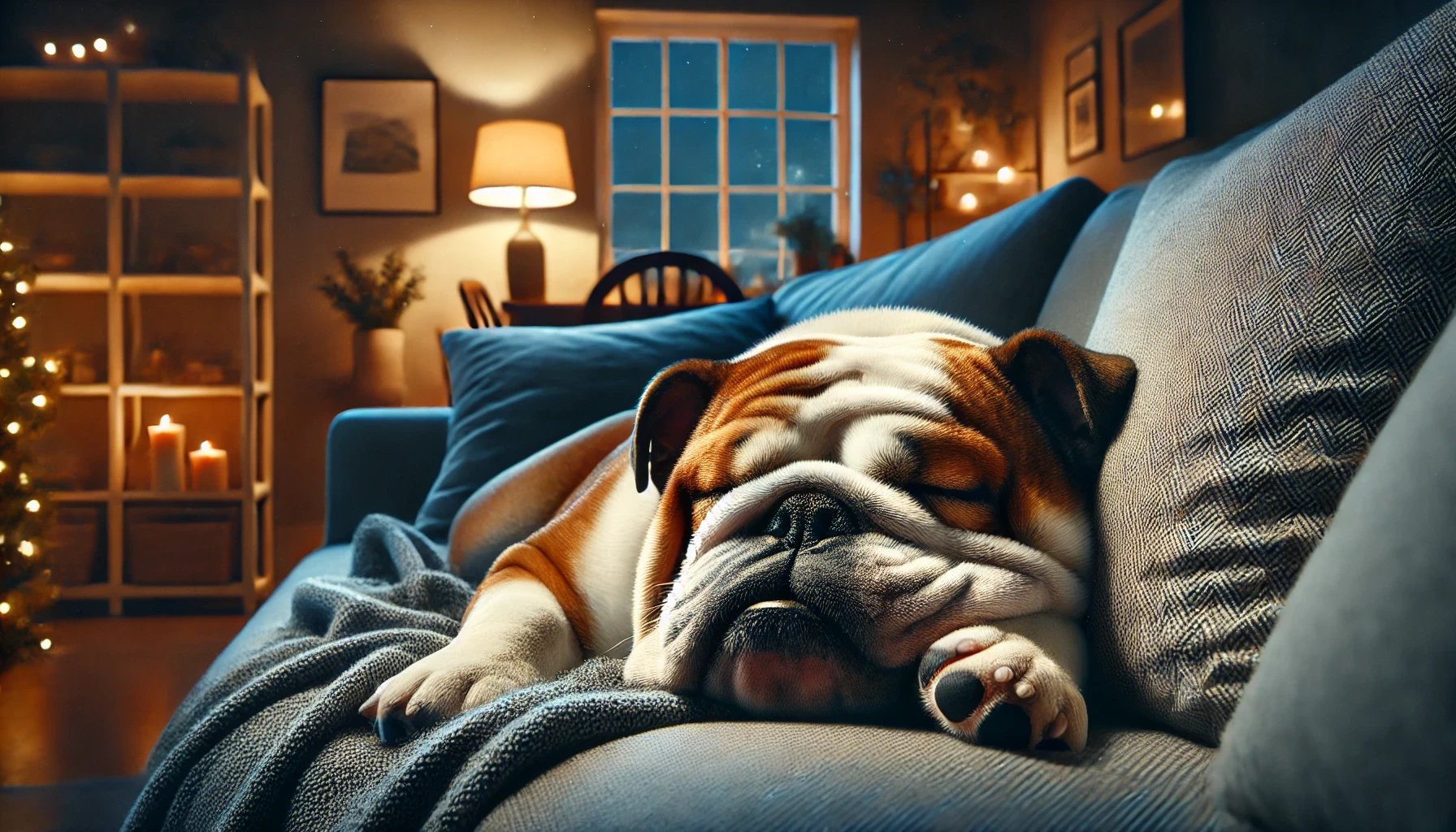On this page
Is It Normal for Bulldogs to Snore Loudly?
Yes, it is normal for Bulldogs to snore due to their unique physical characteristics. Bulldogs are a brachycephalic (short-nosed) breed, meaning their flattened faces and narrow airways make them prone to snoring. However, excessive or loud snoring can sometimes indicate underlying health issues such as obesity, respiratory problems, or allergies.
Understanding why your 4-year-old Bulldog snores is crucial to ensuring their comfort and overall health. This article will explore the causes of snoring in Bulldogs, when to be concerned, and how to help your dog breathe better at night.
Why Do Bulldogs Snore More Than Other Breeds?
Yes, Bulldogs snore more frequently than other breeds due to their brachycephalic anatomy.
Bulldogs have a shortened skull structure, which affects their nasal passages and airflow. Their elongated soft palate, narrow nostrils, and thick neck tissues can partially obstruct their airways, leading to loud snoring. These physical traits make snoring a common characteristic of the breed.
Key Causes of Snoring in Bulldogs
Brachycephalic Anatomy: Their flat faces and narrow airways restrict airflow.
Relaxed Throat Muscles: During sleep, their throat muscles relax, further narrowing their airways.
Sleeping Position: Lying on their back can exacerbate snoring due to gravity affecting the throat tissues.
Learn more about Bulldog-specific health concerns at Dosty.co.
Could Your Bulldog’s Weight Be Contributing to Snoring?
Yes, excess weight can make snoring worse in Bulldogs.
Obesity is a common issue in Bulldogs, and excess fat around the neck and chest can put pressure on their airways. This further restricts airflow and increases the likelihood of loud snoring. Maintaining a healthy weight is crucial to reducing snoring and improving your Bulldog’s overall health.
Signs Your Bulldog May Be Overweight
Difficulty breathing or panting even at rest.
Decreased energy levels or reluctance to exercise.
Visible fat deposits around the neck or abdomen.
How to Manage Weight
Feed a balanced, portion-controlled diet tailored to their needs.
Incorporate regular, moderate exercise such as short walks or play sessions.
Consult a vet for a weight management plan if obesity is a concern.
Find diet and exercise tips for Bulldogs with our App

Could Allergies Be Causing Your Bulldog to Snore?
Yes, allergies can lead to increased snoring in Bulldogs.
Environmental or food allergies can cause inflammation and mucus buildup in your dog’s nasal passages, making it harder for them to breathe. Bulldogs are especially sensitive to allergens due to their already compromised airways.
Common Allergens for Bulldogs
Environmental: Pollen, dust mites, mold, or seasonal changes.
Food: Ingredients such as wheat, soy, or dairy.
Household Irritants: Smoke, perfumes, or cleaning products.
Solutions for Allergy-Related Snoring
Use an air purifier to reduce allergens in your home.
Switch to a hypoallergenic diet if food allergies are suspected.
Consult a vet for antihistamines or other treatments if allergies persist.
Could Snoring Be a Sign of a Health Problem?
Yes, excessive snoring in Bulldogs can sometimes indicate an underlying health issue.
While snoring is common in Bulldogs, sudden or worsening snoring could point to respiratory conditions, infections, or anatomical abnormalities. It’s important to monitor your dog’s snoring and consult a vet if you notice other symptoms.
When to Be Concerned
Sudden Onset: Snoring becomes louder or starts abruptly.
Difficulty Breathing: Wheezing, coughing, or labored breathing.
Frequent Wake-Ups: Your dog seems restless or wakes up repeatedly during sleep.
Possible Health Issues
Brachycephalic Obstructive Airway Syndrome (BOAS): A condition caused by the breed’s anatomical features.
Respiratory Infections: Such as kennel cough or sinusitis
Nasal Obstructions: Foreign objects or polyps in the nasal passages.
How Can You Reduce Your Bulldog’s Snoring?
Yes, there are steps you can take to help reduce your Bulldog’s snoring and improve their breathing.
While you can’t completely eliminate snoring in Bulldogs, simple lifestyle adjustments and management strategies can make a significant difference. Ensuring your dog is comfortable and breathing easily is essential for their overall well-being.
Tips to Reduce Snoring
Adjust Sleeping Position: Use a raised bed or pillow to elevate their head and open their airways.
Humidify the Air: Use a humidifier to keep your home’s air moist and reduce airway irritation.
Regular Vet Checkups: Schedule routine exams to monitor their respiratory health.
Avoid Irritants: Keep your dog away from smoke, strong odors, and allergens.
Discover more tips for improving your dog’s comfort at Dosty.co.

Why Does Your Bulldog Snore Loudly at Night?
Yes, it’s normal for a 4-year-old Bulldog to snore due to their unique anatomy, but loud or excessive snoring can sometimes indicate a need for lifestyle changes or medical attention. Factors like weight, allergies, or sleeping position can all contribute to snoring, and addressing these issues can help your dog breathe more comfortably.
Key Takeaways
Snoring is common in Bulldogs due to their brachycephalic structure.
Obesity, allergies, and respiratory issues can worsen snoring.
Simple adjustments like elevating their head or using a humidifier can reduce snoring.
Take steps to improve your Bulldog’s comfort! Visit our Pet Care Super App Dosty for expert solutions and resources.


